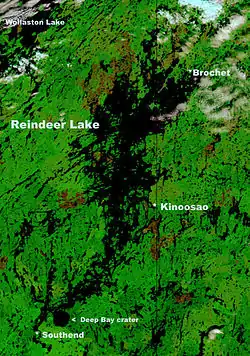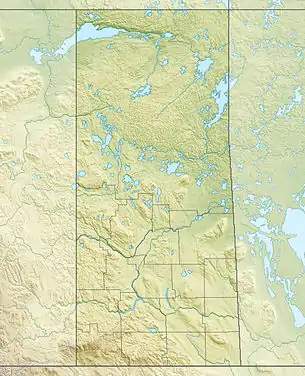Reindeer Lake
Reindeer Lake is a lake in Western Canada located on the border between northeastern Saskatchewan and northwestern Manitoba, with the majority in Saskatchewan. The name of the lake appears to be a translation of the Algonquian name. It is the 24th largest lake in the world by area, as well as being the second-largest lake in Saskatchewan and the ninth largest in Canada. 8% of the lake lies in Manitoba and 92% of lake in Saskatchewan.
| Reindeer Lake | |
|---|---|
 | |
 Reindeer Lake | |
| Location | Division No. 18, Saskatchewan / Division No. 23, Manitoba |
| Coordinates | 57°18′N 102°22′W |
| Lake type | Glacial |
| Primary inflows | Cochrane River (Canada) |
| Primary outflows | Reindeer River |
| Catchment area | 60,000 km2 (23,000 sq mi) |
| Basin countries | Canada |
| Max. length | 230 km (140 mi) |
| Max. width | 60 km (37 mi) |
| Surface area | 5,650 km2 (2,180 sq mi) |
| Average depth | 17 m (56 ft) |
| Max. depth | 219 m (719 ft) |
| Water volume | 95.25 km3 (77,220,000 acre⋅ft) |
| Residence time | 9 years |
| Shore length1 | 3,394 km (2,109 mi) |
| Surface elevation | 337 m (1,106 ft) |
| Islands | numerous |
| Settlements | Kinoosao, Brochet, Southend |
| References | [2][3] |
| 1 Shore length is not a well-defined measure. | |
Geography
Reindeer Lake has a heavily indented shoreline and contains numerous small islands. On its eastern shore is the community of Kinoosao, at its northern end Brochet, Manitoba; and at its southern end, Southend, Saskatchewan. It drains mainly to the south, via the Reindeer River and a controlled weir, to the Churchill River and then east to Hudson Bay. Water flow out of the lake is regulated by the Whitesand Dam.
Deep Bay, located at the south end of the lake and measuring about 13 kilometres (8.1 mi) wide and 220 metres (720 ft) deep, is the site of a large meteorite impact dating about 99 million years ago.[4] According to local Cree legend, it is also the location of a lake monster.[5]
Development
Several early explorers including David Thompson travelled through the lake. It did not serve a major role in the fur trade as only a few short-lived trading posts were established. Today road access to the lake is provided by Highway 102 that terminates at Southend, Saskatchewan, and Highway 302.[6]
Fishing
Fishing is an important industry in the area and sport-fishermen are drawn by its clear and deep waters. Trophy-sized pike are common at Reindeer Lake. The lake also supports light commercial fishing.[7] Fish species include walleye, yellow perch, northern pike, lake trout, Arctic grayling, lake whitefish, cisco, round whitefish, burbot, white sucker and longnose sucker.
Several bays and islands on Reindeer Lake host fishing lodges.
NORAD Tracks Santa
Reindeer Lake was a featured Santa Cam location from the start of the 2002 NORAD Tracks Santa tracking season to the end of the 2011 season when NORAD opted to switch to a regional format the next year instead of the individual profiling of cities they had been doing.[8]
References
- "NASA Visible Earth (BURN SCARS IN SASKATCHEWAN, CANADA) Note: Dark to light rust coloured areas are burn scars from forest fires". August 24, 2002. Retrieved 2014-09-14.
- "Google Maps Distance Calculator". daftlogic.com. Retrieved 2015-01-09.
- "World Lake Database (Reindeer Lake)". Archived from the original on 2015-09-20. Retrieved 2015-01-09.
- "Deep Bay crater". Earth Impact Database. University of New Brunswick Planetary and Space Science Centre. Retrieved 2011-01-05.
- Johnson, Will (2015-08-18). "Chasing the Deep Bay Monster". Nelson Star. Retrieved 2019-01-22.
- Lewry, Marilyn (2006). "Reindeer Lake". Encyclopedia of Saskatchewan. Canadian Plains Research Center. Retrieved 2011-01-05.
- "Industry Profile - Commercial Fishing". SaskNetWork. Government of Saskatchewan - Ministry of Education. 2003. Archived from the original on 2010-09-04. Retrieved 2011-01-05.
- 2010 - 23 - Reindeer Lake - SK - Canada - NORAD Tracks Santa - English. North American Aerospace Defense Command. December 24, 2010. Retrieved 2011-01-05.